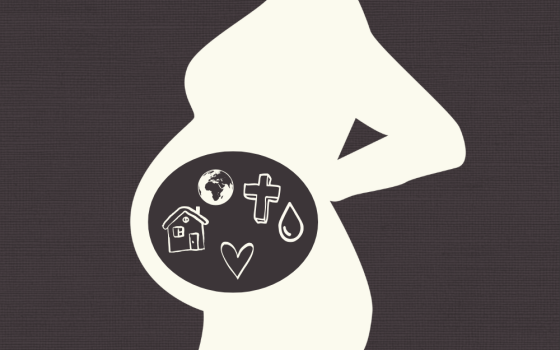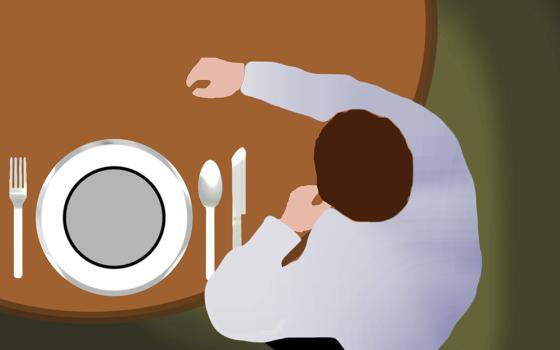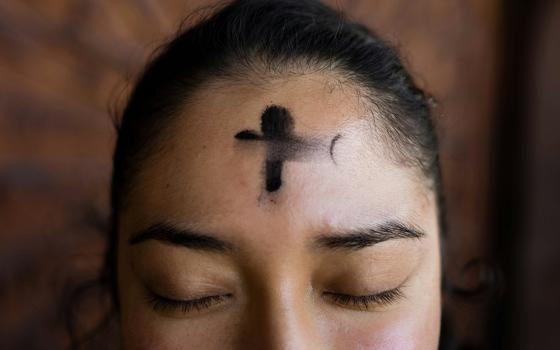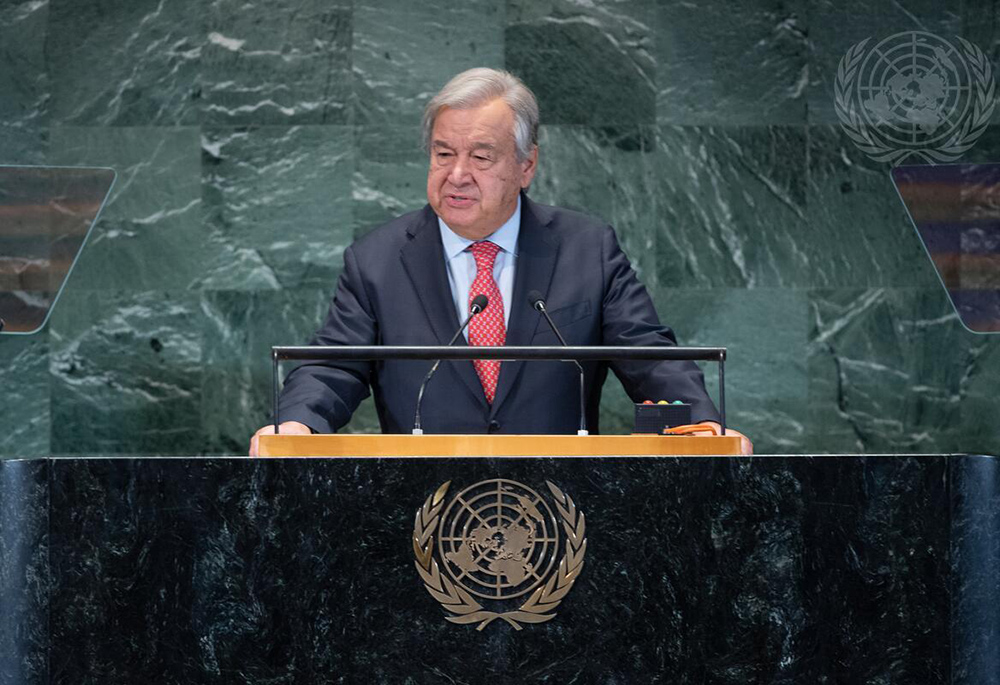
United Nations Secretary-General António Guterres speaks as the SDG Summit, the high-level political forum on sustainable development goals, begins Sept. 18 at U.N. headquarters in New York. (UN photo/Cia Pak)
The United Nations' 17 sustainable development goals are in trouble.
That was the clear consensus of U.N. officials, Catholic sisters and other activists as the world body completed a mid-point assessment of how U.N.-member states are, or are not, progressing in global efforts to end poverty and other social and economic ills by 2030.
Speaking at U.N. headquarters in New York during the start of a two-day (Sept. 18-19) high-level summit on the sustainable development goals, or SDGs, U.N. Secretary-General António Guterres told U.N. delegates that "only 15% of the targets are on track and many are going in reverse."
"Instead of leaving no one behind, we risk leaving the SDGs behind," Guterres said of the ambitious goals inaugurated in 2015.
In a final political statement adopted by the U.N. General Assembly, U.N. members acknowledged that "The achievement of the SDGs is in peril. At the midpoint of the 2030 Agenda, we are alarmed that the progress on most of the SDGs is either moving much too slowly or has regressed below the 2015 baseline."
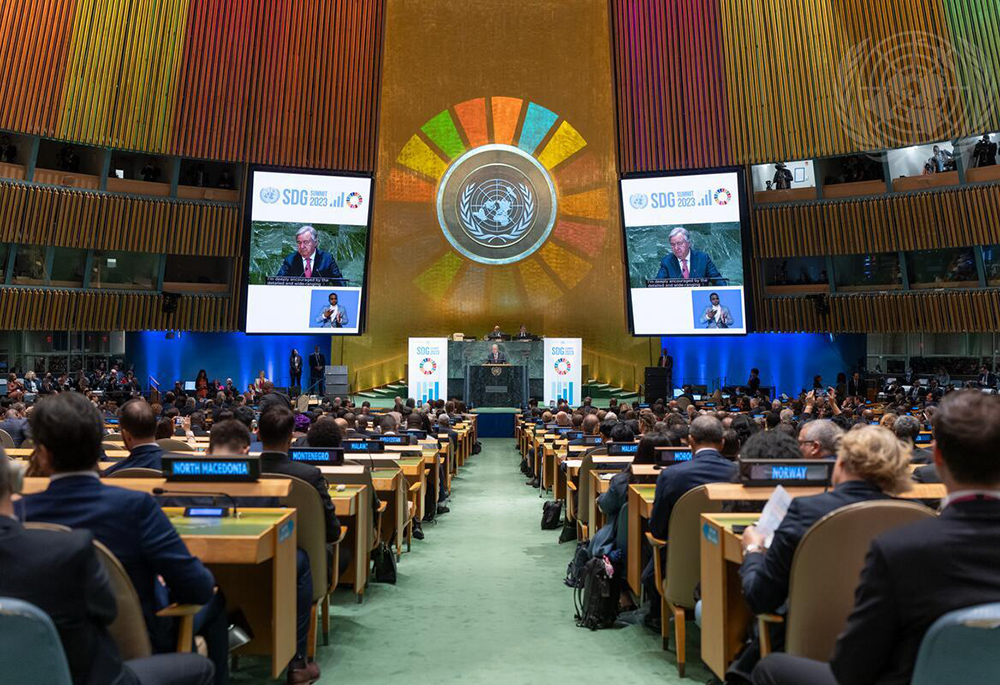
Secretary-General António Guterres, addresses the opening of the SDG Summit at the United Nations in New York on Sept. 18. "The SDGs aren’t just a list of goals. They carry the hopes, dreams, rights and expectations of people everywhere. And they provide the surest path to living up to our obligations under the Universal Declaration of Human Rights, now in its 75th year," he said. (UN Photo/Cia Pak)
Dennis Francis, a diplomat from Trinidad and Tobago who is the president of the United Nations General Assembly, said in remarks delivered on Sept. 18 that "Despite commitments to eradicate poverty and to reduce hunger being at the core of this agenda — alarmingly, 1.2 billion people were still living in multidimensional poverty as of 2022."
He added: "It is estimated that approximately 8% of the global population — or 680 million people — will still be facing hunger in 2030."
Women religious and others whose U.N.-based advocacy work and grassroots mission efforts connect with those most affected by poverty and other ills also expressed worries.
"It is deeply troubling," said Adrian Dominican Sr. Durstyne "Dusty" Farnan, who represents the Dominican Leadership Conference at the United Nations. "The SDGs are more than a piece of paper. We have 124 million people in poverty."
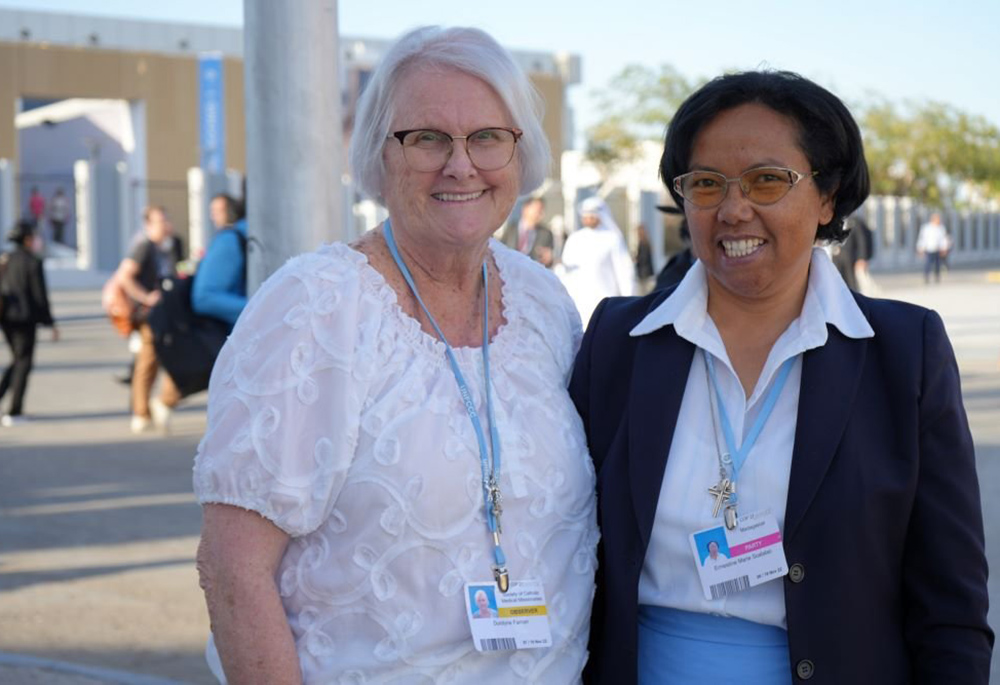
Adrian Dominican Sr. Durstyne Farnan, left, from Michigan, poses with Sr. Ernestine Lalao, a member of Our Lady of Charity of the Good Shepherd from Madagascar at the 2022 U.N. climate change conference in Sharm el-Sheikh, Egypt. (EarthBeat photo/Doreen Ajiambo)
Still, in a post-summit interview with Global Sisters Report, Farnan said that the lack of progress should not discourage efforts by sisters and others "working for all."
"As women religious, we have a responsibility to those not making it."
But so do political leaders, said Farnan and others, and a significant part of activities at the United Nations last week was to pressure all parties — but particularly governments — to recommit to the sustainable development goals, which have faced multiple challenges. These include economic turndowns, the effects of the global pandemic, the Russo-Ukrainian war and continued debt service by developing countries which siphon money away from social programs.
"We've got to have financial reform for developing countries," Farman said. "If we don't, we will not achieve the 2030 goals."
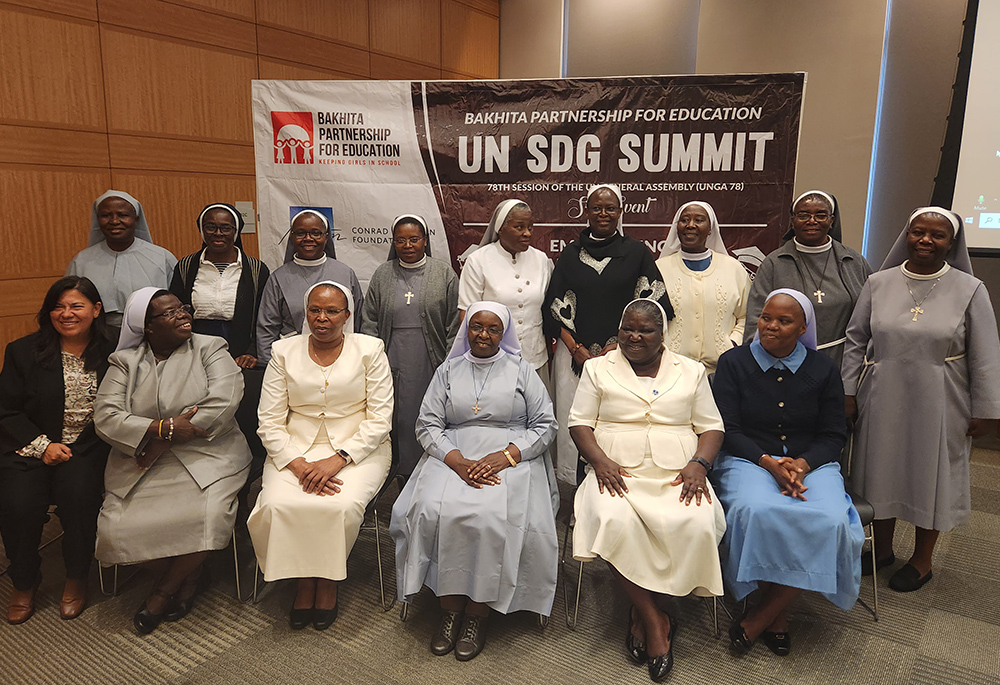
Participating sisters from Africa gather at a Sept. 18 SDG Summit "side event" at Fordham University on improving educational opportunities for girls and young women in Africa. One focus of the event was the work of Kenya-based Bakhita Partnership for Education. (GSR photo/Chris Herlinger)
The numbers behind the goals are sobering, Farnan and others said.
In remarks at one of the many "side events" during the United Nations meetings — this one at Fordham University on improving educational opportunities for girls and young women in Africa — Simone Yankey-Ouattara, coordinator with the African Union International Center for Girls and Women's Education in Africa, said Sept 18 that statistics about girls' education in Africa are "alarming" and underscore "the pressing need and urgency of investing in girls' education."
Yankey-Ouattara cited a report which said that, in Africa, 32.6 million girls of both primary and lower secondary school age are out of school, "with 9.3 million of them likely to never set foot in a classroom."
She added that "further evidence points to a loss of lifetime productivity and earnings for countries, amounting to between $15 [trillion] and $30 trillion due to a lack of girls' secondary education."
"This demonstrates how girls' education is not only a sociopolitical issue; but an economic one as well," Yankey-Ouattara said. Echoing this, she added, a report stated "that every additional year of schooling for girls can increase their future earnings by 10-20%."
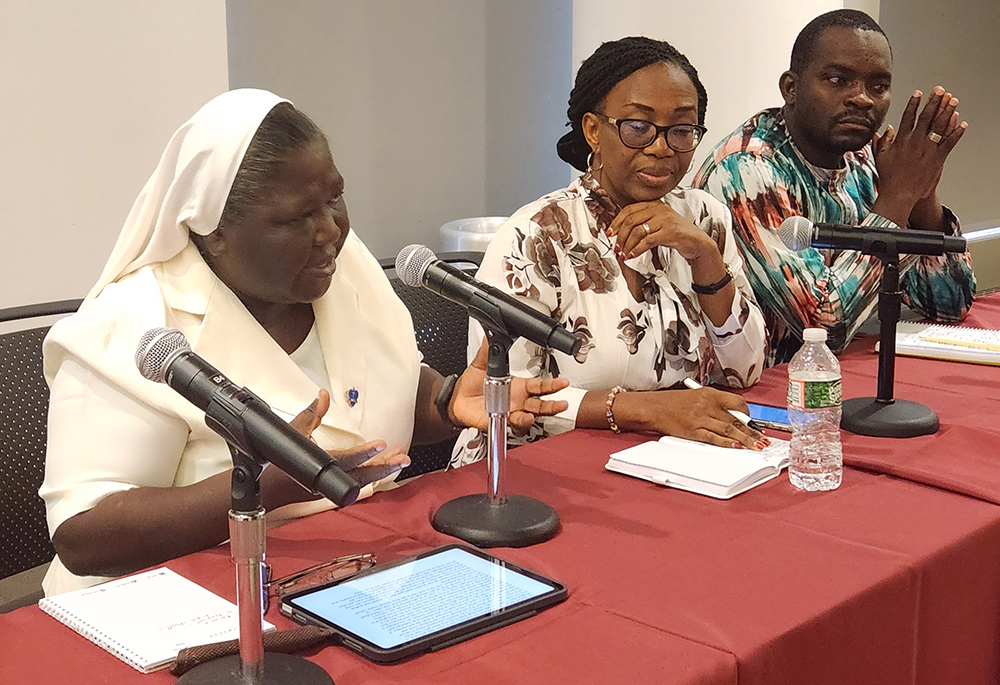
Among those speaking at a Sept. 18 side event were Sr. Josephine Anto, left, a girls education advocate and a member of the Society of the Holy Child Jesus in Ghana, and Simone Yankey-Ouattara, a coordinator with the African Union International Center for Girls and Women's Education in Africa. (GSR photo/Chris Herlinger)
Also worrying: the effects of the pandemic, with some saying that as many as 11 million girls might not have returned to class following reopening of schools.
Sr. Jane Wakahiu, a Little Sister of St. Francis of Kenya, and associate vice president of program operations and head of the Catholic Sisters Initiative at the Conrad N. Hilton Foundation struck a similar theme in discussing education, the focus of SDG 4. (The Hilton Foundation is the primary funder of Global Sisters Report.)
Data from U.N. reports, she said, indicate that "250 million [children] are not in school, and one in every six children is out of school. This means we are not meeting SDG 4 because 58 million children who should have been in school have no chance for elementary education."
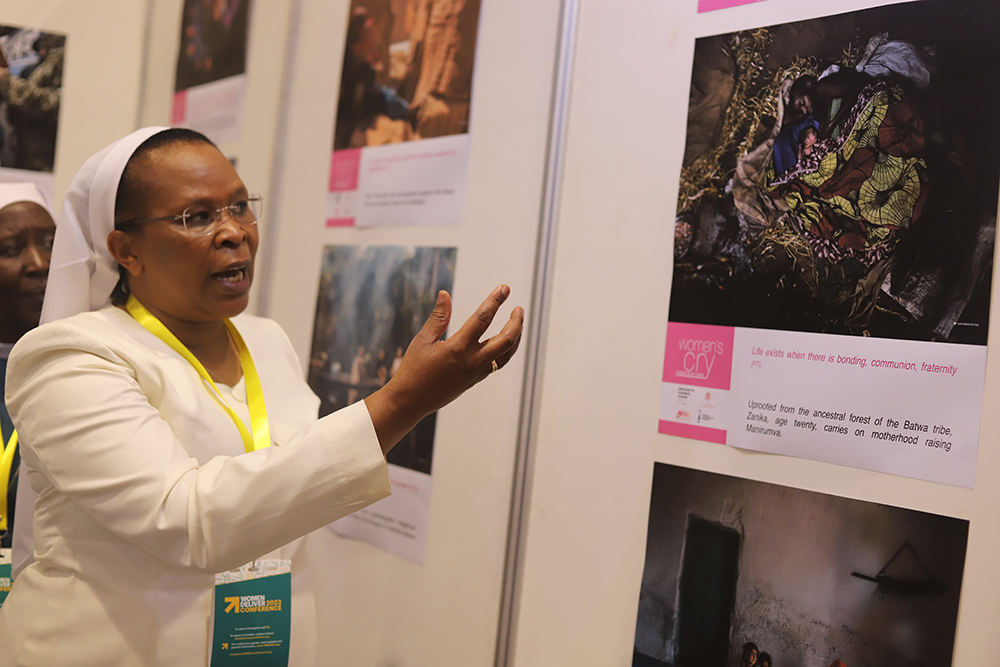
During a July 18 side event of the Women Deliver 2023 Conference in Kigali, Rwanda, Sr. Jane Wakahiu explains an image in which a woman is breastfeeding a newborn baby lying on the floor. Wakahiu, of the Institute of the Little Sisters of St. Francis, also highlighted some of the challenges women in poverty experience. (GSR photo/Doreen Ajiambo)
At a Sept. 14 online "side event" prior to the two-day summit and sponsored by the U.N-based and sister-led advocacy group UNANIMA International, Good Shepherd Sr. Winfred Doherty, who represents her congregation at the United Nations, argued that two factors are hampering the achievement of the sustainable development goals.
One is that the "current U.N. system has not managed to keep abreast of global current developments," she said. Secondly is that the prominence of "corporate partnerships" with the United Nations is "erosive in the system, and is not the enabler it proposed to be."
"Some of the players are not inclusive of foundational principles such as well-being of people and planet, human rights, gender equality, resource sharing," Doherty said. "Rather they are a counterforce, an opposing force, raging and plundering, wielding exploitative power over people and governments while breaching international law and planetary boundaries with impunity."
Doherty said examples include the engagement of UN Women — the U.N.'s principal body on women's issues — with asset management firm BlackRock, and the prominence of representatives from fossil fuel companies at last year's COP27 climate conference in Egypt.
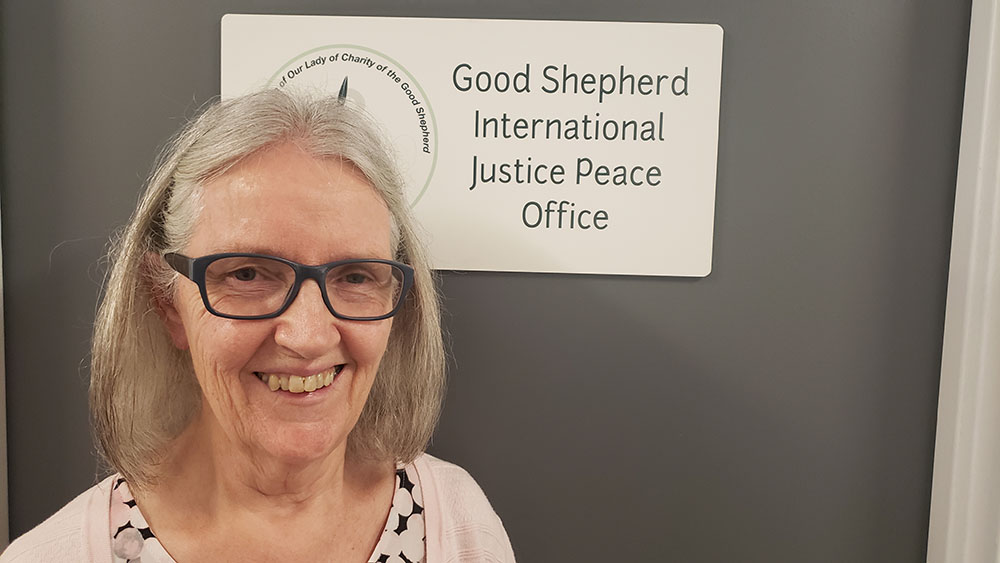
Sr. Winifred Doherty, the main U.N. representative of the Congregation of Our Lady of Charity of the Good Shepherd (GSR photo/Chris Herlinger)
She said the world is facing a " 'poly-crisis' of climate emergency, new conflict, inflation, democratic dysfunction, the rise of authoritarianism — and all contributing to the mass movement of people. The behaviors of some are driving conflict, poverty and environmental degradation."
There are also long-standing social challenges to face.
At the Fordham University event, numerous speakers spoke not only of the ongoing educational crisis facing girls and young women in Africa, but also the continued crisis of misogyny, sexism and sexual abuse faced by females there.
Current programs — like the Kenya-based Bakhita Partnership for Education, which is funded by the Hilton Foundation's Catholic Sisters Initiative — are trying to build on a long tradition and practice of Catholic education in Africa and are helping boost efforts to achieve SDG 4, which focuses on quality education, and SDG 5, focused on gender equality.
Several beneficiaries of the Bakhita program spoke online during the session about the importance of programs to support them and their healing and ongoing educational ambitions.
"I know there are lot of girls who are struggling in silence," said one 18-year-old Kenyan woman who has survived rape and incest by a family member but who is now studying law at a Catholic university in Kenya. "I want to be a voice for the voiceless," she said.
Advertisement
Sr. Josephine Anto, a girls education advocate and a member of the Society of the Holy Child Jesus in Ghana, and a member of a group of visiting African sisters who attended SDG-related events in New York last week as part of a Women in Faith Leadership Fellowship program, said education — much of it done by Catholic institutions and led by Catholic sisters — that affirms the well-being of girls and young women must be a priority in coming years.
"Each girl has a God-given gift," she said during a panel discussion. "We must empower them."
In the end, empowering people is a foundation for the sustainable development goals, and the final political declaration of the SDG summit declared that U.N. members "commit to bold, ambitious, accelerated, just and transformative actions, anchored in international solidarity and effective cooperation at all levels. We will promote a systemic shift towards a more inclusive, just, peaceful, resilient and sustainable world for people and planet, for present and future generations."
It added:
We remain resolved, between now and 2030, to end poverty and hunger everywhere; to combat inequalities within and among countries; to build peaceful, just and inclusive societies; to respect, protect and fulfill human rights and achieve gender equality and the empowerment of all women and girls and to ensure the lasting protection of the planet and its natural resources.
Farnan said she takes some encouragement in that, saying that, "The Political Declaration was accepted wholeheartedly and without objection by the member states. This gives me hope that we will obtain the fulfillment of the SDGs."
At the Sept. 14 UNANIMA event, Ambassador Fergal Mythen, the permanent representative of Ireland to the United Nations, praised the work of "civil society" groups in the ongoing process of seeing that the sustainable development goals become a reality.
"The role of civil society is hugely important," he said, and encouraged groups — like sister congregations — to continue their advocacy work at the United Nations and elsewhere. "What's important," he said, despite the disappointing numbers about the SDGs, "is not to give up now."
Farnan agreed, urging the global community to not get discouraged — though she noted that one task for sisters and others in the United States is that "we must advocate for our country to work for the fulfillment of the SDGs."
"It's a commitment to the people," she said. "Let's do it."




